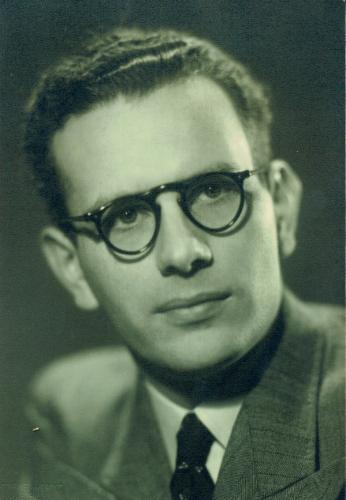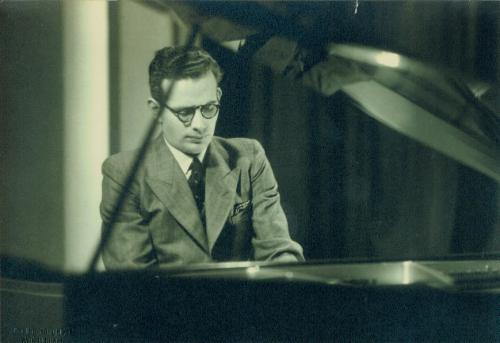Carel Jacobs


Carel Jacobs was an outstanding student at the Nederlandsche R.K. Kerkmuziekschool (Dutch Roman Catholic Church music school), where he studied composition with Johan Winnubst. Feeling unsafe as 'Vierteljude', he gave up his conducting classes with Carl Schuricht in Germany. During the war he helped many people in hiding and got caught and escaped twice. He conducted several choirs in the east of the Netherlands and became the director of the conservatory in Enschede. His compositions vary from chamber music to music for his own choirs.
by Dr. Hans van Dijk
Domine, non sum dignus
Carel Wilhelmus Joseph Jacobs was born on March 26, 1909 in 's-Heerenberg, a small town in the municipality of Montferland. His father Joannes Jacobs was a well-known figure as the local hairdresser and a competent musician. His mother Anna Bossmann was half-Jewish and from the German town Emmerich. After marrying Joannes in 1907, she converted to Catholicism. The couple soon belonged to the well-to-do middle class of the town.
Carel received his first music lessons from his father: flute, clarinet, cornet à pistons, trombone, violin, piano and organ. In a later stage of his career, he was primarily occupied with wind music. At the Nederlandsche R.K. Kerkmuziekschool (Dutch Roman Catholic Church music school), established in 1925 in Utrecht, he studied with Father Caecilianus Huigens O.F.M. from September 1926 onwards, and soon became one of the outstanding students. The training focussed on singing, conducting and accompaniment of Gregorian chant; furthermore organ and piano lessons, substantiated with pedagogy and didactics. Crucial components were theoretical subjects and music history. Carel was one of the first generation to study composition. The lessons were taught by Johan Winnubst (1885-1934), choir master of the Utrecht Cathedral. Assessing Winnubst’s compositions, he was a solid professional who conveyed his skills to Carel without imposing any particular musical direction.
Organist and conductor
After graduating with honor in July 1929, the outbreak of the economic crisis hampered him in finding suitable employment. Eventually on April 1, 1930, he was appointed organist to the St. Jacobus Church in Enschede. His tasks included accompanying the church choir and, as of 1932, also the newly established boys' choir. A few years later, thanks to his excellent pedagogical skills, he became 'director-organist' of both the church choir and the boys' choir. The musical level improved enormously during the years 1936 to 1942; both choirs were frequently invited to perform for the KRO (Catholic Broadcasting Radio). In the same period we often come across his name in Twente as conductor of other choirs and wind orchestras. In the years 1936-1940 there was a 'Jewish Boys Choir' in Enschede, also conducted by Jacobs.
As of May 1, 1936, Carel was appointed as conductor of 'Soli Deo Gloria', a choir of Protestant signature in Nijverdal. Here too, he saw an opportunity to raise the level significantly. The choir was accustomed to the 'Liedertafel repertoire' common at that time. Carel introduced Bach cantatas and works by contemporary composers like Olivier Koop and his former teacher Johan Winnubst. On March 28, 1942, he initiated the annual performance of Bach's St. John Passion. Unfortunately a continuation was impossible due to the founding of the Kultuurkamer on April 1st, and neither Carel nor the choir were registered. The tradition was not resumed until April 13, 1946. In addition, well-known oratorios of Haydn, Handel (the Messiah in the Dutch language), etc. were performed.
Schuricht's assistent
His acquaintance in 1936 with Carl Schuricht (1880-1967), at that time guest conductor of the Residentie Orchestra, was of great significance. Carel had always wanted to be an orchestral conductor, but due to the economic misery of the 1930s that never happened. Up to that time, his only work experience was conducting choirs and wind orchestras. Schuricht envisaged many possibilities for Carel. In the summer of 1936, while attending Schuricht’s conducting course in Berlin, Carel also caught Wilhelm Furtwängler's attention. However, Carel decided not to continue the course in 1937 because he felt unsufficiently safe as a ‘Vierteljude’ (quarter Jew) in Germany and a prolonged stay would also mean loosing all the securities he had accumulated in Enschede.
As chief conductor of the Utrechts Stedelijk Orkest (Utrecht Municipal Orchestra) in the years 1937-1939, Schuricht appointed Carel Jacobs as his assistant. In practice, this meant studying and rehearsing with the orchestra, however he never conducted public concerts. The many hours of travelling and rehearsing compelled him to cease these activities in the autumn of 1939. After the liberation in 1945, Klaas de Rook organized concerts in Enschede for young people with the semi-professional Twentsch Chamber Orchestra (as of May 1, 1947 the Twentsch Philharmonic Orchestra). He asked his friend Carel Jacobs to conduct these concerts. After Klaas de Rook's death in 1952, his successor, Yvon Baarspul, took over all the orchestra's concerts, which ended Carel's career as a symphony orchestra conductor.
Jochen Domp
Joachim (Jochen) Domp, born in Münster in 1910, studied musicology and obtained his doctorate in 1933 in Fribourg (Switzerland) with a dissertation on music at the royal courts in Westphalia. As a Jew in Hitler's Germany in the 1930s, there were no employment opportunities for him and he emigrated to Enschede in 1937, where he acquired a music business. That’s how he met Carel Jacobs and they became great friends. The ailing music business was soon revived. But the workload was so heavy that he asked his sister Helge to join him for assistance, followed in December 1938 by their parents. Shortly thereafter, the Dutch government prohibited the establishment of German business people in the Netherlands. Carel often visited the store and became well-acquainted with the Domp family.
In April 1941, a German fiduciary took over the company on behalf of the occupiers. Jochen decided to flee and join the Allied armies. Via Belgium and France he ended up in Fribourg and contacted his former university. Unable or unwilling to assist, they advised him to report his presence to the police. Which Jochen did, but he was immediately arrested on suspicion of espionage and some months later expelled. Across the Vichy-France border, he was again arrested and sent to Germany. He eventually ended up in Auschwitz in August 1942, and died, probably in April 1945, during one of the infamous 'death marches'. After much effort (!) the elderly Helge Domp finally received in 2007 apologies in a letter from the Fribourg authorities for the fierce attitude of their predecessors. But it didn't bring back her brother.
Help to people in hiding
Soon after Jochen's departure, the Domp family searched for a hiding place and found one in the Veluwe countryside. Carel provided them with money, clothing, books and ration cards, until the railroad strike in September 1944 made his activities impossible. A month later, he himself was arrested. In the spring of 1942, his sole source of income came from church activities because he hadn't registered with the Kultuurkamer. Additionally, several musical societies had also ended their work. At that time, Reverend Leen Overduin from Enschede, established a clandestine relief action for Jews and other people in hiding. Colleague and friend Klaas de Rook introduced Carel to Reverend Overduin. The relief action provided care for hundreds of people in hiding. However, they were obviously betrayed, because Carel Jacobs, the Reverend and a number of others were arrested. They were lucky: their train to Germany was shelled just over the border and many escaped safely. They walked back to Enschede. Carel went into hiding with the De Rook couple until it appeared that they were no longer looking for him.
In October 1944, he was again arrested and immediately deported to Germany. He ended up in the Rees concentration camp (near Emmerich) and escaped at night in the freezing cold by swimming across a lake. In wet clothes he reached the Dutch border, was taken care of by resistance fighters and brought to his parental home in ' s Heerenberg. On April 1, 1945, Enschede was liberated and a few days later Carel returned to his parish.
Conservatory Director
In the post-war years, Carel taught school music for a while at Enschede's Lyceum and was selected as an inspector of music education. This resulted in his appointment as director of the TIVO folk music school, an institute originating from a merger between some private music schools and a municipal institution. A year later, the municipality Enschede and the TIVO folk music school decided to establish a music academy. In December 1965, the music school and academy were separated, the latter continuing as the Twents Muzieklyceum. Carel became its director and in that position he witnessed the renaming of this institution into the Twente Conservatory on June 21, 1972.
For him, accepting the role of director at a professional music institution meant resigning from all other activities. However, he remained a music critic. Already writing reviews prior to 1940, he carried on in the post-war years, up to 1973, as a capable but often sharp and feared critic of the Twentsche Courant.
After retiring in 1974, Carel and his wife moved to an assisted living home, where they experienced calm and happy years. His wife died in August 1980, causing a shock from which he would not recover. He died on Christmas Eve in that same year.
From late romanticism to Neue Sachlichkeit (New Objectivity)
As a composer, Carel Jacobs was not a prolific writer; 58 titles of compositions are known, about a third of which has been lost and another third unfinished or still in initial stages of sketching. In total, half (more or less) of his oeuvre is ready for performance. Only one work (opus 32!) survives from his student years (1926-1929); the rest was destroyed by the composer himself.
This sonatina for piano is written in a late romantic French style (influenced by Johan Winnubst) and a technique somewhat recalling Liszt; Carel was an excellent pianist. In his subsequent compositions he had clearly improved both in style and technique. Apart from a cleverly constructed six-part motet Ecce Sacerdos (1933), works from the period 1934-1940 are intended for small ensemble or choir, with an additional number of unfinished scores. Here his style drastically changed, in line with Expressionism and the then popular ‘New Objectivity’.
The composers who significantly influenced Carel's work are Busoni and especially Paul Hindemith whose dissonant counterpoint appealed to him: the art of putting two or more voices opposite to each other, while retaining their independence despite dissonant intersections. The limits of tonality are approached and even occasionally exceeded. As Hindemith’s heart and soul always shines through his music, likewise is Carel Jacobs' approach always focussing on the pleasure of playing.
After 1940, Carel Jacobs' music lacks these characteristics. His employers obviously demanded good functional music: melodious and technically not too difficult. The following anecdote is typical of Carel: His Missa suavis (1955) for boys' choir and organ had already been performed several times when organist Alphons Gaalman noticed that the organ part in its simplicity was far from interesting. Upon which Carel, instead of changing the original version, wrote an entirely new organ part with considerably more technical demands.
The fact that his kyrie-trope Kyrie-Magnae-Deus (1934-1935) was selected from 84 submissions for one of the concerts of the Manifestations of Dutch Music (MANETO) in June 1937, performed by Hans Gruys (soprano), Johan Feltkamp (flute) and Leo van der Lek (oboe), demonstrates that the quality of his work was already recognized at an early stage. Works by leading composers as Nico Richter, Hans Henkemans, Jan Mul, Henri Zagwijn, Piet Ketting and Leo Smit were also performed at this festival. Despite its title, this is not church music but chamber music set to a religious text. Originally, this work was dedicated to Helge Domp who had followed singing lessons in Germany, but because of her inevitable exile had stopped her music studies prematurely.
